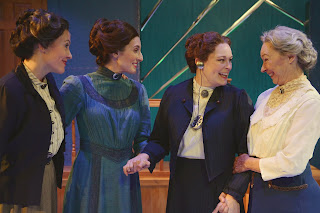Finding room for wonder and details in the universe: "Silent Sky" introduces a new theater group

After I first encountered Walt Whitman's poem "When I Heard the Learn'd Astronomer" in my teens, I thought it supported my defensive posture about science. My initial enchantment with stars and dinosaurs several years before was fading against the challenge of actual high-school science classes, getting simple experiments to come out right and all that. So I took the poet's departure from an astronomy lecture to contemplate the heavens unaided as superior to studying them; it wasn't the only time in adolescence I grabbed onto something in order to justify an immature perspective. I felt confirmed especially by the line "How soon unaccountable I became tired and sick." The women of "Silent Sky" celebrate astronomical advances. The poem is quoted at a crucial place in "Silent Sky," the stunning inaugural production of Summit Performance Indianapolis, which I saw in preview Thursday night at Phoenix Theatre 's Basile The










